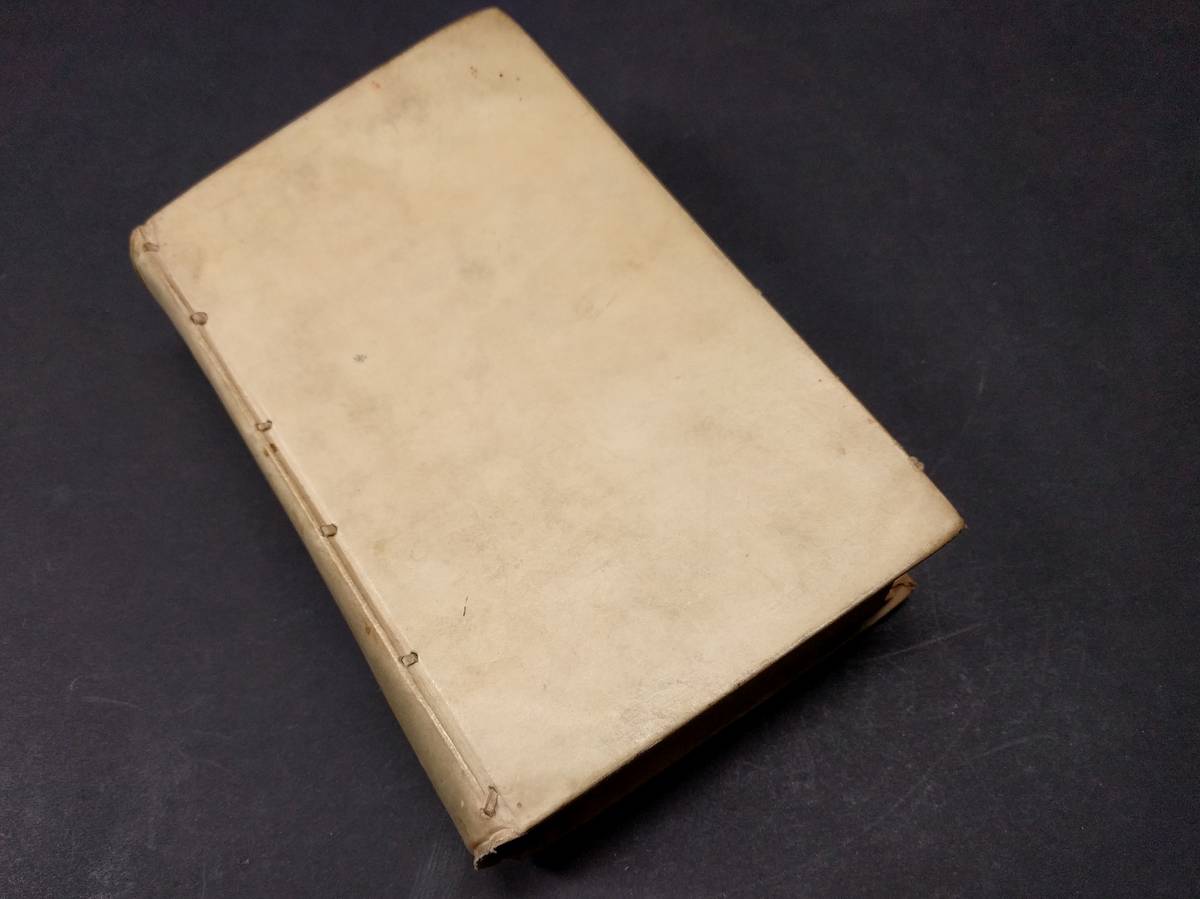OVIDIUS.
P. Ovidii Nasonis Opera omnia, in tres tomos divisa, cum integris notis Nicolai Heinsii D.F., lectissimisque Variorum notis. Quibus non pauca, ad suos quaeque antiquitatis fontes diligenti comparatione reducta, accesserunt, studio Borchardi Cnippingii. (Volumen 1)
Amsterdam (Amstelodami), Ex typographia Blauiana, Sumptibus Societatis, 1683.
8vo. (XVI),832,(14 index),(2 blank) p., One portrait of Ovid. Vellum. 20 cm (Volume 1 of 3) (
Ref: STCN ppn 852573480; Schweiger 2,631: 'Bloss Wiederholung der Ausgabe von 1670'; Brunet 4/272: 'Cette édition est belle, et les notes en sont plus et mieux choisies'; Dibdin 2,267/8: 'Yet (of the Variorum editions) that of 1683 is perhaps the general favourite'; Graesse 5,70; Ebert 15368; Rahir 2784, 'Annexes de la Collection Elzevirienne') (
Details: Volume 1 of 3 only. One engraved portrait of Ovid. Engraved frontispiece, depicting the Judgment of Paris; in the foreground Amor and a peacock, in the background Troy
. This volume contains the Latin text with extensive commentary of the 'Heroides' (p. 1/308), 'Amores' (p. 309/510), 'Ars Amatoria' (p. 511/680), 'Remedia Amoris' (p. 681/738), the fragment 'Medicamina Faciei' (p. 738/748), 'Halieuticon' (p. 749/760), 'Consolatio ad Liviam' (p. 761/793), and 'Nux' (p. 793/806); at the end have been printed 3 verse epistles, each written in the person of a legendary woman to her absent lover, forged by the Italian humanist and impersonator of Ovid, Angelo Sabino, or Angelus Sabinus, floruit 1460/1480. The 3 hoax poems were for a long time attributed to Aulus Sabinus, a friend of Ovidius) (
Condition: Binding age-tanned. Upper corner of back cover damaged. This is volume 1 of 3 only) (
Note: The Roman poet Ovid, 43 B.C. - 17 A.D, 'is perhaps the most consistently influential and popular writer of the classical tradition. His central position is suggested by the many surviving manuscripts of his works and their early publication in printed editions. (...) Most would agree that it is his Metamorphoses that has had the greatest influence, but his other major poems, the Heroides, Tristia, Fasti, and particularly his racier works, the Amores, Ars amatoria, and Remedia amoris, have played their part in maintaining his reputation as a writer of enduring importance and appeal'. (The Classical Tradition, Cambr. Mass. 2010, p. 667)
§ Ovid was widely read in antiquity, and remained to be read at the Carolingian court in the Middle Ages. Ovid became also the favourite poet of the Renaissance. Boccaccio and Petrarca were influenced by him. Shakespeare was inspired more by Ovid than by Vergil. (Neue Pauly 9,110/119) The huge number of editions and translations suggests that Ovid's appeal lies also beyond the bounderies of the scholarly and literary world.
§ A new age (1658-1837) dawns in the textual history of Ovid's poems with the work of the famous Dutch scholar, neolatin poet and diplomat, Nicolaas Heinsius, 1620-1681, 'who, after 345 year, remains the central figure in any account of the editing of Ovid. No modern editor will fail to mention his name in the preface as the 'sospitator Ovidii; no 'apparatus criticus', will fail to cite his numerous contributions to the improvement of the text'. (P.E. Knox (ed.), 'A companion to Ovid', Chichester 2013, online version) Heinsius' editions of Ovid offer texts that are based on an extensive first hand knowledge of the manuscripts, and that are supplemented with a full textual commentary which records and discusses 'variae lectiones', and notes alterations of the vulgate text. (Sandys 2,323/6)
§ Our edition of 1683 is a reissue an an edition of 1670, published in Leiden. It is a so-called 'Variorum' edition. Such an edition generally offers a 'textus receptus' which is widely accepted, accompanied with the commentary and the annotations of various specialists, taken, or excerpted from earlier useful, normative or renewing editions. Editions like these were useful, but never broke new ground. This Variorum edition was produced by the Dutch classical scholar of German descent Bochardus Cnippingius, 1623/24-1674. At the age of 23 or 24 he was appointed Rector of the Schola Latina at Culemborg. He gave up this position and moved to Leiden to teach classics at the local 'Schola Latina', later he became Conrector. Cnippingius' edition was the main source for the Ovid translation of the English poet John Dryden. (J.A. van der Welle, 'Dryden and Holland', Groningen 1962, p. 122/24)) (
Collation: *8, A-3G8 (leaf 3G8 blank)) (Photographs available on request)
Book number: 156283 Euro 90.00
Keywords: (Oude Druk), (Rare Books), Altertumswissenschaft, Altphilologie, Blaeu, Cnippingius, Dichtkunst, Dutch imprints, Latin literature, N. Heinsius, Ovid, Ovidius, Poesie, Variorum, antike altertum antiquity, classical philology, poetry, römische Literatur
 OVIDIUS.
OVIDIUS.